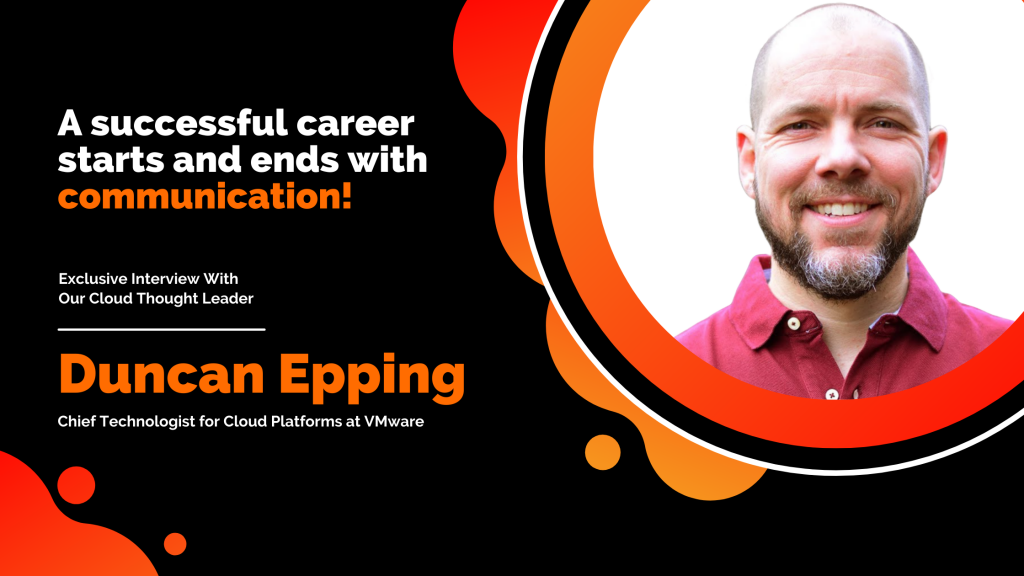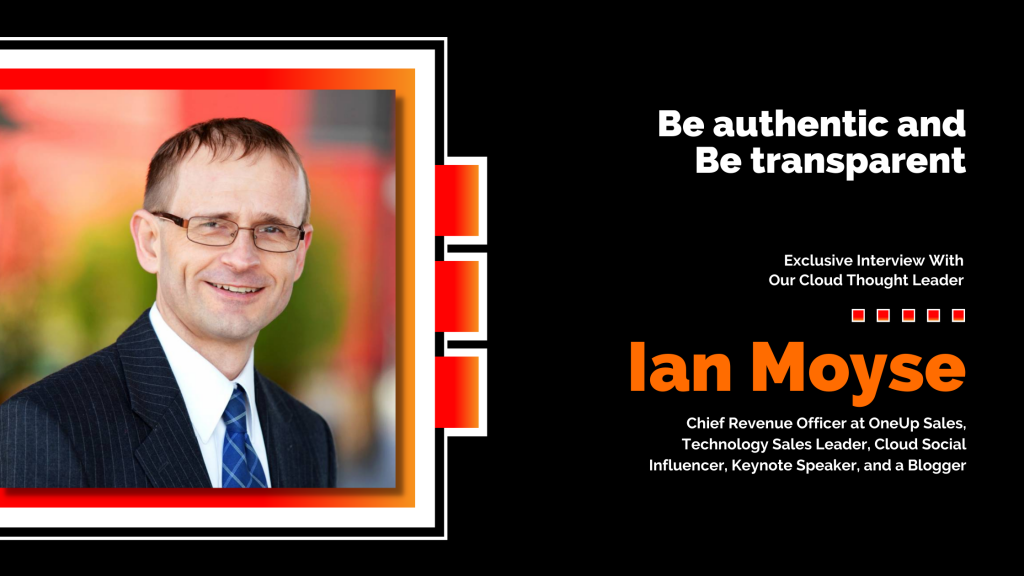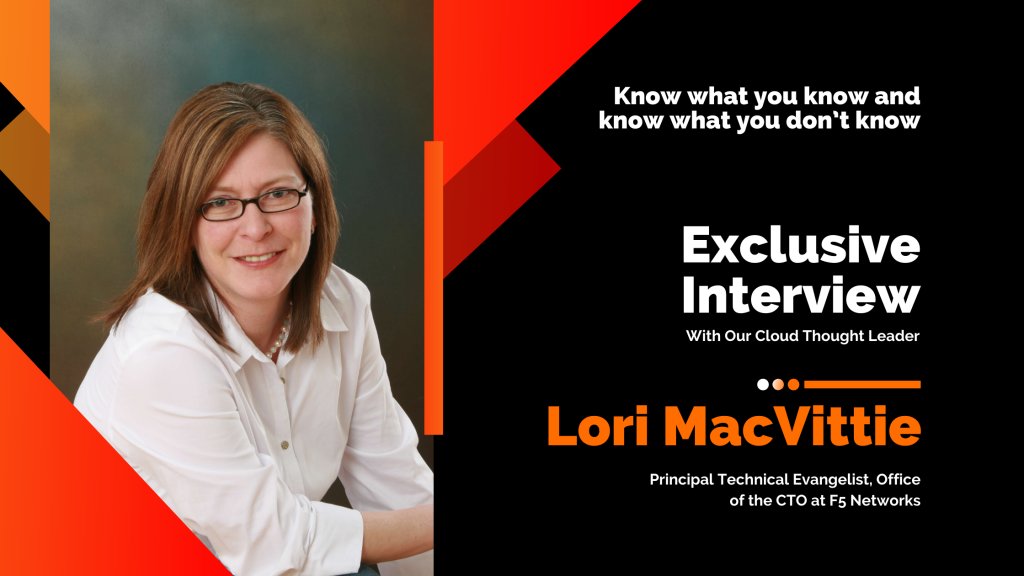Duncan Epping – Chief Technologist for Cloud Platforms at VMware is one among our 150+ Top Global Cloud Thought Leaders and Next Generation Leaders of 2021. When Whizlabs reached out to him for an email interview, he was the quickest to respond and surprised all of us with his humbleness. His favourite quote is “Stay Hard by David Goggins” and if he could recommend one book, it would definitely be “Can’t Hurt Me: Master Your Mind and Defy the Odds.”
Duncan is a VMware Certified Design Expert, and surprisingly he is amongst the first few people to get certified in VCDX007. He is currently VMware’s Senior Director and Chief Technologist for Cloud Platforms. During his 13+ years of journey in the field, he has become an answer to the questions regarding Storage, Availability, Virtualization and Cloud to many. He is a regular keynote speaker at IP EXPO, Partner Exchange and VMUG User conferences globally. His personal blog Yellow Bricks is all about VMware related virtualization. He says “Yellow Bricks, building blocks for virtualization are solid, but flexible at the same time because you can virtually build anything.” He chose the name of the blog from the Arctic Monkeys song, Old Yellow Bricks, and is a must read for anyone who is planning on expanding their career in cloud computing or virtualization.
Follow Duncan Epping on Twitter, LinkedIn, and Blog/Website
Let’s get to know him a little more today!
1. What was your first job?
My first job was basically a networking project for the Dutch Police Force in Rotterdam. I was responsible for a network migration. That sounds fancy, but it was a migration to new cables, so I spent 6 months going from datacenter room to datacenter room swapping out cables.
2. How will you describe your journey to become a successful professional in Cloud Computing?
My journey is probably very similar to the journey most people took. I started out in IT doing basic tasks, evolved to a server and MS Windows admin. Moved from Microsoft to VMware, and since then very much focused on simplifying architecture and operations for customers. I was fortunate though that I was recruited by VMware along the way!
3. When did you actually realize true love for Cloud Computing?
To be honest, for me, cloud is not necessarily a thing or a must, or something I love even. It can be a great solution for customers for certain (or all) use cases. To me the most important thing is that our customers have a solution that works for them and meets their requirements. I love happy customers.
4. Walk us through your journey of first ever certification in the field of cloud computing? How did you make that decision?
I haven’t taken a specific route to be honest, as I work for VMware, my focus the past 13 year was VMware based certifications, and I decided 11 years ago that the VMware Certified Design Expert certification was my ultimate goal.
5. Globally recognized cloud thought leadership comes with lots of responsibility. What is your advice for your followers?
My main advice to people is to keep communicating. I believe that a successful career (and in your personal life) starts and ends with communication. Without communication everything comes to a full stop eventually.
6. Everyone now knows that cloud computing is the future. What do you think?
We have seen a pendulum swing from centralized to decentralized etc for the past decades. I feel the future is hybrid cloud. With that meaning, a combination of private cloud, public cloud and edge.
7. Anyone who follows you would love to become you (or better than you) at some point, and many of them will be confused on how to start or where to start. Can you share some of the obstacles you have faced at the beginning and the ways you have overcome those?
I don’t think everyone would like to become me to be fair, and I don’t think anyone should aim for that either. Hopefully everyone is aiming to become a better version of themselves, as I feel that is most important. Stay true to who you are, focus on what you are passionate about!
Duncan Epping’s favourite quote is “Stay Hard by David Goggins”
8. A good leader is someone who never stops learning and always willing to un-learn anything if needed. What are your valuable learnings and un-learnings during your journey to a thought leader?
The most important thing is, as I have already mentioned a few times, communication. On top of that, I think it is also important to not be afraid to step out of your comfort zone, to challenge yourself regularly to learn and do new things.
9. In your words, tell us the leadership skills that everyone should learn?
Communication! Note, this is a 2-way street, a large portion of it is being a great active listener.
10. What is that one thing which motivates you to become more and more better everyday?
I am mainly driven by curiosity, I love figuring out how things work, and then on top of that I thoroughly enjoy sharing how things work with others.
11. Other than personal learning, what are you currently learning in the technical field? Any new field of interest?
I am interested in all new technologies, this can be anything ranging from Virtual Reality to AI and ML. So much to explore these days.
12. If we dare to ask, how would you rate the following cloud providers – AWS, Microsoft Azure, Google Cloud, Alibaba cloud?
I feel that is very difficult to say, as each cloud has it’s unique capabilities. In other words, depending on your requirements, one could be seen as “better” than the other, and this will vary from customer to customer and between geographical locations as well.
Thank you Duncan Epping for your valuable time! Keep inspiring!
- Top 20 Questions To Prepare For Certified Kubernetes Administrator Exam - August 16, 2024
- 10 AWS Services to Master for the AWS Developer Associate Exam - August 14, 2024
- Exam Tips for AWS Machine Learning Specialty Certification - August 7, 2024
- Best 15+ AWS Developer Associate hands-on labs in 2024 - July 24, 2024
- Containers vs Virtual Machines: Differences You Should Know - June 24, 2024
- Databricks Launched World’s Most Capable Large Language Model (LLM) - April 26, 2024
- What are the storage options available in Microsoft Azure? - March 14, 2024
- User’s Guide to Getting Started with Google Kubernetes Engine - March 1, 2024


